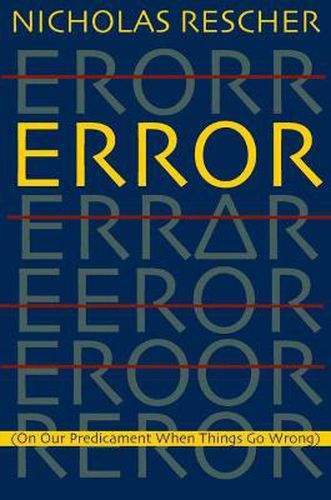Readings Newsletter
Become a Readings Member to make your shopping experience even easier.
Sign in or sign up for free!
You’re not far away from qualifying for FREE standard shipping within Australia
You’ve qualified for FREE standard shipping within Australia
The cart is loading…






In Error, Nicholas Rescher presents a fresh analysis of the occurrence, causality, and consequences of error in human thought, action, and evaluation. Rescher maintains that error-avoidance and truth-achievement are distinct but equally important factors for rational inquiry, and that error is inherent in the human cognitive process (to err is human). He defines three main categories of error: cognitive (failure to realize truths); practical (failure related to the objective of an action); and axiological (failure in evaluation), and articulates the factors that contribute to each. His discussion also provides a historical perspective on the treatment of error in Greek philosophy, and by later thinkers such as Aquinas, Descartes, Spinoza, Leibniz, James, Royce, Moore, and Russell.
Error is an important reexamination of the significance of error to the fields of philosophical anthropology, epistemology, ontology, and theology. As Rescher\u2019s study argues, truth and error are inexorably intertwined-one cannot exist without the other. Error is an unavoidable occurrence in the cognitive process-without missteps on the path to truth, truth itself cannot be attained. The risk of error is inherent in the quest for truth.
$9.00 standard shipping within Australia
FREE standard shipping within Australia for orders over $100.00
Express & International shipping calculated at checkout
Stock availability can be subject to change without notice. We recommend calling the shop or contacting our online team to check availability of low stock items. Please see our Shopping Online page for more details.
In Error, Nicholas Rescher presents a fresh analysis of the occurrence, causality, and consequences of error in human thought, action, and evaluation. Rescher maintains that error-avoidance and truth-achievement are distinct but equally important factors for rational inquiry, and that error is inherent in the human cognitive process (to err is human). He defines three main categories of error: cognitive (failure to realize truths); practical (failure related to the objective of an action); and axiological (failure in evaluation), and articulates the factors that contribute to each. His discussion also provides a historical perspective on the treatment of error in Greek philosophy, and by later thinkers such as Aquinas, Descartes, Spinoza, Leibniz, James, Royce, Moore, and Russell.
Error is an important reexamination of the significance of error to the fields of philosophical anthropology, epistemology, ontology, and theology. As Rescher\u2019s study argues, truth and error are inexorably intertwined-one cannot exist without the other. Error is an unavoidable occurrence in the cognitive process-without missteps on the path to truth, truth itself cannot be attained. The risk of error is inherent in the quest for truth.